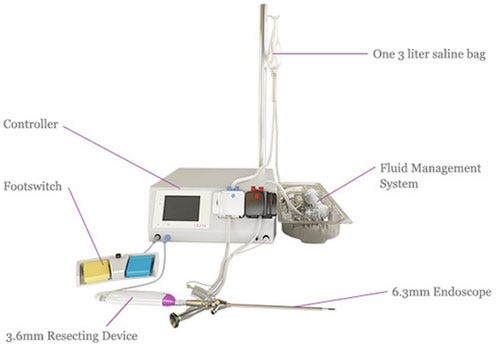May 7, 2014
Boston Scientific has scooped up the remainder of IoGyn, Inc., a pre-commercial stage Cupertino, CA, company that makes the Symphion system, which is described as a next-generation system for hysteroscopic intrauterine tissue removal including fibroids (myomas) and polyps.
The IoGyn acquisition will broaden Boston Scientific's portfolio of minimally-invasive approaches for surgeons to treat debilitating gynecologic conditions. Boston Scientific began investing in IoGyn in August 2012, and before the deal to complete the takeover was announced, had a 28 percent stake in the company. According to Boston Scientific's press release, "Total consideration included a net cash payment of approximately $65 million at closing to acquire the remaining 72 percent of IoGyn and repay outstanding debt." The company expects the transaction to have a negligible impact on its adjusted earnings per share in 2014 and 2015, and to be accretive starting in 2016.
|
IoGyn's Symphion system (Courtesy IoGyn/Boston Scientific |
The Symphion system is an alternative to the power morcellation techniques that were the subject of a recent FDA Safety Communication. Power morcellation is now believed to worsen the spread of a rare cancer, sarcoma, within the abdominal cavity. Johnson & Johnson's Ethicon subsidiary announced in late April that they had suspended sales of their Gynecare Morcellex Tissue Morcellator, Morcellex Sigma Tissue Morcellator System and Gynecare X-tract Tissue Morcellator, although the companies noted that the technology remains an important option for some patients.
The hysteroscopic approach used by the Symphion system resects the growth within the uterus and removes the tissue through its recirculating and filtering fluid management system. In contrast, to the previous power morcellation approach, IoGyn says, the Symphion system treats fibroids and polyps within the uterus and evacuates the tissue under suction. Boston Scientific says it is not aware of any reported cases of sarcoma spreading by the surgical removal of tissue within the uterus.
Hysteroscopic removal of symptomatic fibroids and polyps is less invasive and typically safer than common surgical approaches like hysterectomy, and is also designed to preserve a woman's ability to have children.
The Journal of Minimally Invasive Gynecology has published a Technology Overview by Andrew I. Brill, MD, Obstetrics and Gynecology, California Pacific Medical Center, San Francisco, in which Brill concluded, "The IoGyn system represents a very promising addition to, with a potential for being a significant improvement over the armamentarium of currently available systems."
Stephen Levy is a contributor to Qmed and MPMN.
About the Author(s)
You May Also Like



